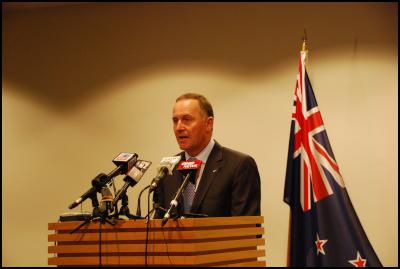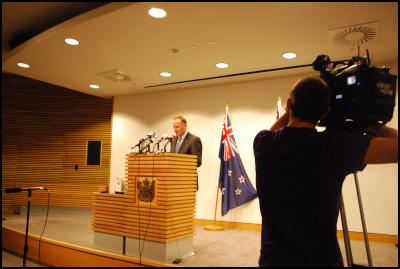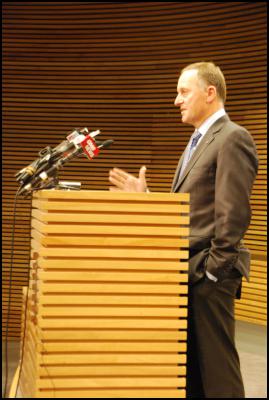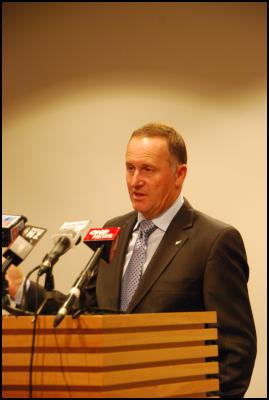PM Press Conference: Rio Tinto at Tiwai Point
PM Post-Cabinet Press Conference - 2 April 2013
By The Scoop Team

The Prime Minister began today's press conference with a brief overview of the priorities of Budget 2013. The government will be focused on four key areas: a return to surplus and reducing debt, creating a more competitive and productive economy, driving better results from public services, and rebuilding Christchurch. Key claimed that the economy is the strongest it's been since pre-recession 2007, with a 3% growth in 2012 outdoing the US, the UK, Japan and the Eurozone. It is yet to see what impact the drought has had on the economy--Key estimated it would cost $1-2 billion. This may affect inflation and the exchange rate.
Key also discussed his intent to strengthen economic relations with China, where he is visiting with a delegation next week. In particular he wishes to emphasise that New Zealand is a good country to do business with, particularly in the area of food security.
Finally, Key made reference to recorded crime statistics, which have reportedly fallen by 7.4%. The number of offences is at its lowest in 24 years. Key credited this to operational changes by the police, which involved them being more involved in communities and preventing crime. This has been made possible with an increase in 600 frontline staff, foot patrols and the usage of Smartphones and tablets. A journalist asked Key for comment on the fact that police clearance has remained static over the past few years--Key suggested taking that matter up with the Minister of Police for an answer.
However, the press conference was dominated by the issue of the Rio Tinto smelter. The government made a small offer to Rio Tinto last Thursday (Key refused to give an exact figure), which was rejected. Key hopes that either a short or long-term agreement will be reached between Meridian and Rio Tinto. He would not be drawn into a definitive answer about which result would be better for the economy.
The government is not interested in creating a long-term subsidy for the smelter. The fact that 15% of NZ power is consumed by smelter may have seemed a logical allocation at the time, key said, but over the long run that power could be used by new ventures. The power currently tied up in Rio Tinto, if loosed at some point, could enable less productive assets to be closed down, and could allow the building of as much generation as required. In the long run, Rio Tinto is not a productive asset--particularly when aluminium prcies are going through the floorboards, but also because of making bad investments.
Key was asked if a decision on Rio Tinto was needed before the asset sales, but said no. When asked what impact the closure would have on the asset sales, Key said he didn't know. He pointed out that Rio Tinto has formed quite an overhang in the New Zealand market, and needs to be dealt with--without being held hostage by the company. Despite the potential uncertainties and risks in the electricity market, Key is quite comfortable with the way things are playing out. He believes there is adequate time within the next 5 and a half years to build a transmission line.
Key was then asked about the GCSB review report from Rebecca Kitteridge, and said he needed to take it to the Intelligence Committee when he returns from China. He feels he owes it to that committee to take them through both the recommendations and the subsequent steps that need to be taken. He was asked about whether the report was controversial or not, and whether it would result in any personnel changes, but would not be drawn into a definitive answer on either, saying the latter was a matter for the Director-General.
Key was then asked about the EQC, and continued with his previous line that human error was to be expected within such organisations. One journalist asked about the possible merits of a central reporting system, given that, as Key admitted, such errors have happened across several organisations. He seemed to dismiss this idea on the basis that each organisation is different, and would require different management.
Key was asked briefly about film subsidies, and whether Disney had come to the New Zealand government to make 20,000 Leagues Under the Sea, but said this had not occurred. Lastly he discussed the Red Zone settlements, talking about the bleakness of the living environment there but emphasising the fact that the settlements are voluntary.
Click a link to play audio (or right-click to download) in either
MP3 format or in OGG format.




ENDS



 Eugene Doyle: Has WWIII Started?
Eugene Doyle: Has WWIII Started? Binoy Kampmark: Fencing The Ocean - Australia’s Social Media Safety Bill
Binoy Kampmark: Fencing The Ocean - Australia’s Social Media Safety Bill Binoy Kampmark: Trump, AUKUS And Australia’s Dim Servitors
Binoy Kampmark: Trump, AUKUS And Australia’s Dim Servitors Peter Dunne: Dunne's Weekly - The Wrong Answer To A Question That Does Not Exist
Peter Dunne: Dunne's Weekly - The Wrong Answer To A Question That Does Not Exist Martin LeFevre - Meditations: Perception, Conception And Beauty
Martin LeFevre - Meditations: Perception, Conception And Beauty Alastair Thompson: On The Publication Of The First NCQG Text 'New Collective Quantified Goal On Climate Finance'
Alastair Thompson: On The Publication Of The First NCQG Text 'New Collective Quantified Goal On Climate Finance'